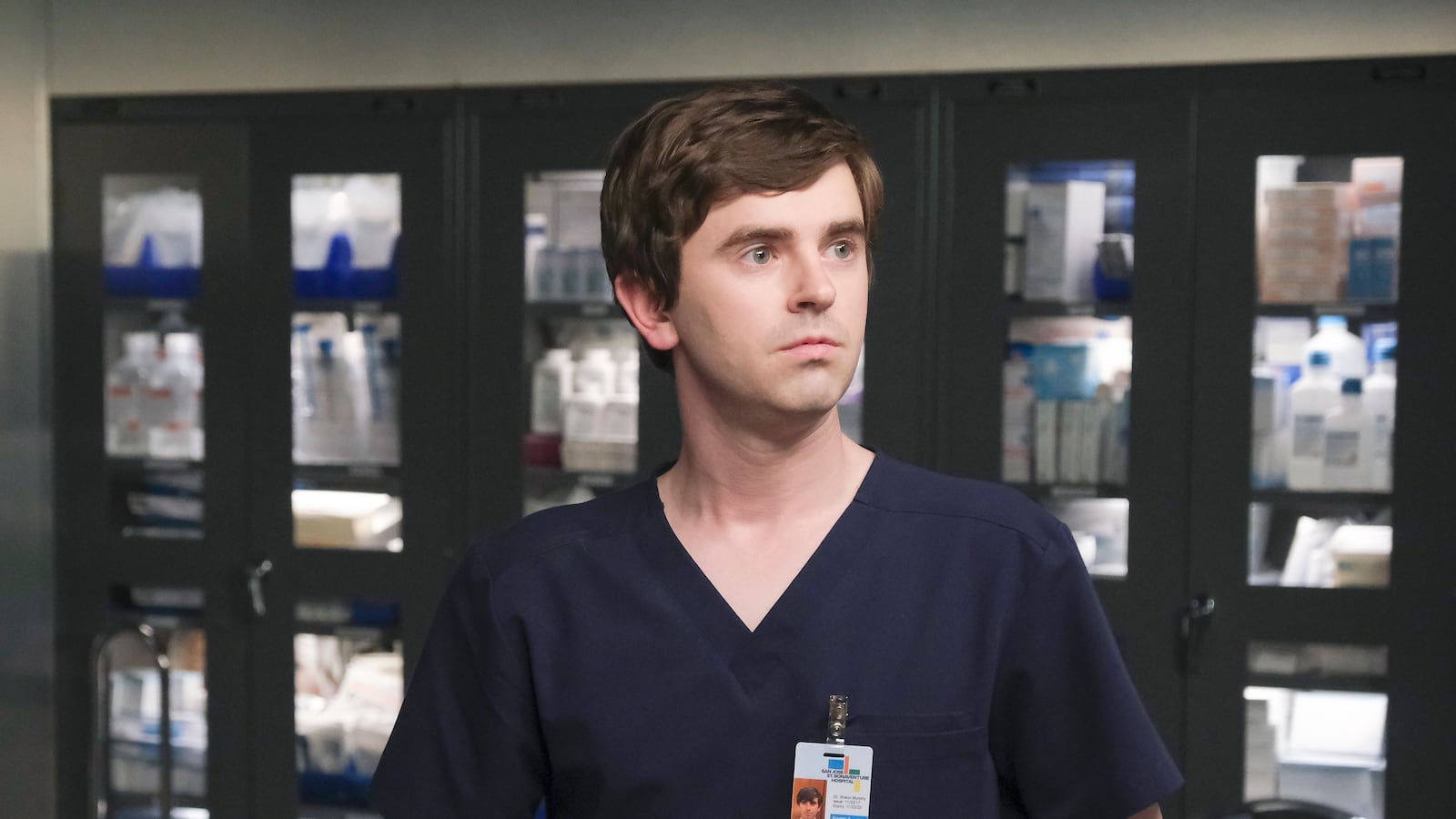Twitter can be a misguided way to gauge popularity. If you go by the volume of perennially online chatter, Succession is the most-viewed series of all time, when in reality, its “record high” is about 2.5 million live viewers. The TV shows that actually bring in the most consistent numbers, the ones beloved by general, non-tweeting audiences, are network comedies and procedural dramas. These are less critically appreciated or “cool” to be a fan of, of course, but the popularity of shows like the FBI and NCIS franchises is far more in line with traditional TV consumption, even in an era of Peak Content.
So, when the ABC series The Good Doctor started going viral on social media this past week, a hell of a lot of people online revealed that they had no idea the show existed. They were even more surprised to find out just how popular it was, especially when certain clips made the rounds.
For those not in the know, The Good Doctor is an American remake of a South Korean series of the same name. Since its 2015 premiere, the show follows an autistic savant named Dr. Shaun Murphy, whose specific brand of neurodivergence both aids and hinders his work as a surgeon at the prestigious San Jose St. Bonaventure Hospital. In its first season (the sixth wrapped up at the beginning of May), the show was pulling in an average weekly viewership of over 15.6 million. That made it a bigger hit than fellow network blockbusters Grey’s Anatomy and Young Sheldon. It has remained a major ratings favorite for the last eight years, sustaining the sort of audience hold that’s far less guaranteed in an age of Too Much TV and endless cancellations.
The Good Doctor is—and has been—a big deal, with a spinoff series in the works focused on a good lawyer with OCD. But it didn’t go viral for good reasons.
Twitter has been aflame with clips from the show, varying from the hilarious to the truly uncomfortable. Some standouts: In one, we see Shaun, played by Freddie Highmore, spring the news on a child that he has cancer, which plays like something from an Adult Swim skit. In another, Dr. Murphy’s inability to cooperate with an armed robber results in a woman being shot. He also accuses a woman of being a terrorist, based solely on the color of her skin.
One Twitter user noted that Highmore walks “like C-3PO,” while another noted the genuine nonsense of a literal doctor apparently not knowing about the existence of trans people. Perhaps the jewel in the meme crown is Shaun repeatedly screaming “I am a surgeon,” which has now been remixed into myriad parodies and increasingly silly riffs that have become the stuff ofTikTok legend. If you can get through watching it without cracking or cringing, you're stronger than steel.
@fakejaredgraham ‼️🐟‼️🐟‼️🐟 #thegooddoctor #iamasurgeon #sturgeon #fishing #bassproshops #fyp #fypシ #foryou #foryoupage ♬ original sound - clickblop
Not since a dog chewed on a heart in One Tree Hill has a popular show with little in the way of an internet footprint become a viral hit. You can’t blame anyone for not wanting to jump in, either. There’s just so much to cover with The Good Doctor, and so much to catch up on, thanks to six absolutely wild seasons. This is a show that takes itself extremely seriously, a procedural that wants to simultaneously be case-of-the-week fizzy entertainment and a solemn study of the life of a neurodivergent individual. Freddie Highmore is, if nothing else, utterly committed in his portrayal of Shaun, a man that is apparently a genius yet also super racist, transphobic, and prone to outbursts of utter cruelty. He says the most ridiculous things, often seems incompetent at his job, and he’s supposed to be the hero!
The “I am a surgeon” meme contrasts Dr. Murphy’s petulant fury with the seemingly over-it calm of Dr. Jackson Han, a series antagonist who is played by the series’ executive producer, Daniel Dae Kim. It’s like watching a bored service worker deal with the ultimate bad customer, almost satisfying in its contrast. You don’t need to know the context to get the joke, but watching all the other clips does add an extra dollop of schadenfreude to the equation.
@knowyourmeme I am a sturgeon. #memes #memesexplained #tiktokmemes #thegooddoctor #iamasurgeon #iamasturgeon #drhan #iamasurgeondrhan #danieldaekim #freddiehighmore #thegooddoctoredit #chad #gigachad #surgeon #sturgeon ♬ original sound - Know Your Meme
Meme makers are drawn to media’s failed attempts at inflated significance, because it’s so easy to burst those bubbles. There are few things more satisfying than knocking down self-satisfied prestige efforts down to size. But there’s a serious side to The Good Doctor’s new Twitter infamy: It’s inspired plenty of criticism, mainly coming from people on the spectrum, who are calling out the harmful stereotypes it perpetuates about autism. In 2018, a trio of doctors reviewed the show for The Hollywood Reporter and noted how "Hollywood depictions underscore the false belief that autistic people only have value if they have savant skills that can benefit non-autistic people, and offset their supposed societal burden." The show portrays Shaun in an infantilized manner, halfway between an out-of-control toddler and a three-legged puppy. While neurodivergent people can have trouble picking up social cues, it’s insulting to write quirky scenes, where someone on the spectrum wouldn’t know what a trans person is or that being racist is somehow an acceptable side effect of their condition.
As the entertainment industry makes incremental progress in terms of diversity (although last year, it actually took a dip), media depictions of people with disabilities of all kinds remain sorely lacking in nuance or care. Pop culture is built on tropes, on a kind of formulaic neatness that leaves little room for the prickly mundanities of real life. That’s why we see the same stereotypes from decades past still recycled over and over again: They’re sturdy storytelling tools, if not necessarily empathetic or realistic portrayals of actual people.
There are so few honest and nuanced portrayals of life on the spectrum in mainstream pop culture, so when one of the biggest scripted shows on network TV pushes a trite, insulting cliché as the default, it only perpetuates society’s prejudiced impression of neurodivergent folks. Series like The Good Doctor take real aspects of what it’s like to live on the spectrum—to struggle with social interactions and the need to stim—and make them almost parodic in their portrayals. The focus becomes less about one’s tools for living and more about all the drama it causes to neurotypical people surrounding them. It doesn't help that the show has done PSAs for Autism Speaks, a hugely controversial group that spent years calling autism a “disease” that needed to be cured, while engaging in irresponsible fear mongering, such as comparing autism to leukemia.
The Good Doctor uses the notion of the savant as a quirky and narratively thrilling storytelling tool. It’s not hard to see why; Rain Man won Oscars for doing it. But it also seems as though the show’s creatives use this trope as a crutch for ableism and outright nonsense, because it either makes for good TV or provides opportunities for plot convenience. Stereotypes exist not just for ease but to also reinforce dangerous attitudes. After all, one of the reasons the clip of Shaun being transphobic got so much attention was because it was posted by a right-wing account, with the caption “transgender cult in TV.” Of course, the replies were full of people siding with Shaun’s comments over the trans child’s own trauma. It’s no surprise, alas, that this chance to dunk on The Good Doctor for its ableism seems to have inspired a lot more ableism from Twitter trolls looking for an easy target.
Laughing at The Good Doctor, in or out of context, is a solid way to dissect its shoddy theatricalities and stunted stereotypes that prioritize neurotypical comfort over subverting ableist conventions. Of course, this amusement is just shared among the online crowd, not the millions of people who have made the series a gigantic hit for ABC. But it’s clear either way that six seasons in, things don’t seem to be improving for the show on the progressive representation front. Mercifully, for those who seek it, there are better options out there for neurodivergent TV representation, from Abed on Community to the recent British children’s series A Kind of Spark, which also stars a young actress on the spectrum. Still, it feels like we’re many years away from pop culture truly catching up with reality on this front. But hey, at least the memes are good.






